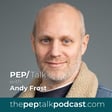
With Steve Osmond
Andy and Kristi sit down with the newest member of the Solas team to discuss his passion for evangelism. Having arrived in Scotland recently from South Africa, Steve Osmond reflects on the opportunities, surprises and challenges we have here. Kristi is also interested in Steve’s background in zoology and how that has informed his conversations with atheists.
Steve Osmond hails from South Africa, where he earned his MSc in Zoology from the University of Johannesburg, specialising in ecotoxicology and ecological risk assessment. Along with his passion for the natural world, he also has a love for theology: exploring the connections between faith and reason, and how Christianity makes sense of the world. He has been involved in pastoral ministry and creating training programmes for discipleship in theology and apologetics. Steve holds a MA in Apologetics & Theology from Southern Evangelical Seminary. He now lives in Perth, Scotland with his wife Robin and two young daughters.



















